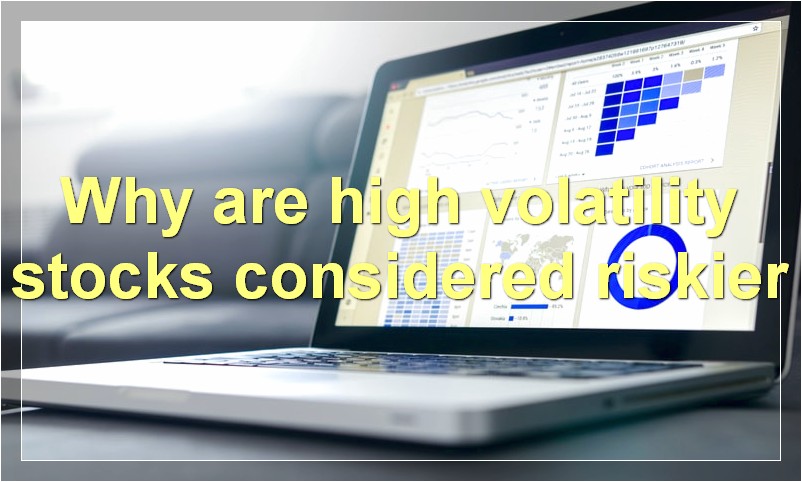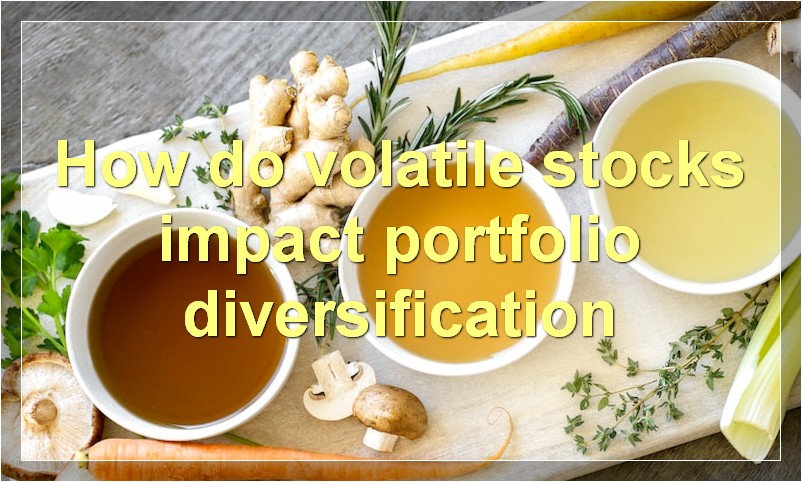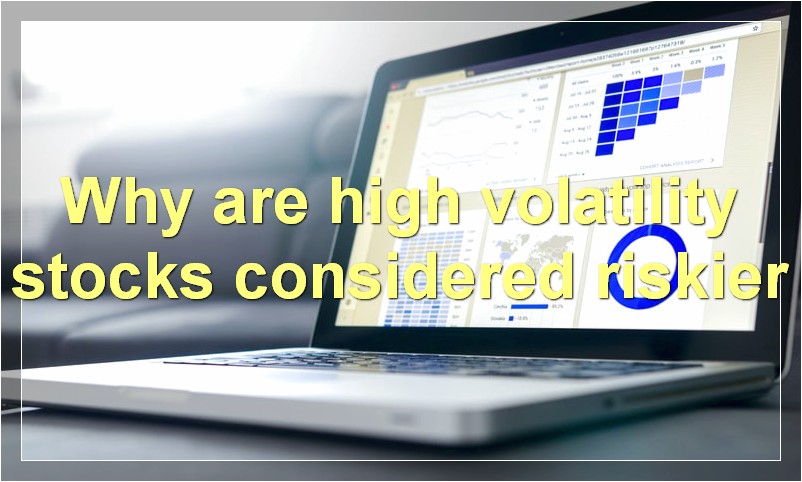If you’re looking to make a quick buck, high volatility stocks are definitely worth considering. However, you need to be aware of the risks involved before making any decisions.
What are high volatility stocks
High volatility stocks are those that experience large swings in price over a short period of time. They can be risky investments, but they can also offer the potential for big rewards.
If you’re thinking about investing in high volatility stocks, it’s important to do your research and understand the risks involved. But if you’re willing to take on a little extra risk, high volatility stocks could be a great way to boost your portfolio’s returns.
Why are high volatility stocks considered riskier

High-volatility stocks are considered to be riskier because they have the potential to lose a large amount of value in a short period of time. This is due to the fact that these stocks are more likely to experience sudden and large swings in price. While this can lead to some big gains, it also means that there is a greater chance of losing money. For investors who are looking to avoid risk, high-volatility stocks may not be the best choice.
What factors contribute to a stock’s volatility
There are a number of factors that can contribute to a stock’s volatility, including macroeconomic conditions, company-specific news, and global events.
Macroeconomic conditions can have a big impact on stock prices, as they can provide insight into the overall health of the economy. If there are concerns about a recession or inflation, for example, this can lead to more volatile stock prices.
Company-specific news can also impact a stock’s volatility. If a company misses earnings estimates or issues a profit warning, for example, this can lead to a sell-off in its shares. And if there is positive news about a company, such as an analyst upgrading its stock, this can lead to increased buying pressure and higher prices.
Global events can also lead to increased volatility in stock prices. If there is political turmoil in another country or an unexpected natural disaster, this can create uncertainty in the markets and lead to more volatile stock prices.
How do investors measure a stock’s volatility
Volatility is a measure of how much the price of a security, derivative, or index fluctuates. It is measured by calculating the standard deviation of the annualized return over a given period of time. The higher the volatility, the greater the price swings.
Investors use volatility to measure risk. When a security is more volatile, it means that there is a greater chance that the price will move in a large direction over a short period of time. This can be good or bad depending on whether the price is moving up or down.
A stock’s volatility can be measured using historical data or implied volatility. Historical volatility looks at past price movements to predict future volatility. Implied volatility uses options prices to infer what investors think about a stock’s future volatility.
Some investors seek out stocks with high volatility because they believe that these stocks will provide greater returns in the long run. However, high-volatility stocks are also more risky and can result in large losses in the short term.
What is the historical average volatility of the stock market
The historical average volatility of the stock market is the standard deviation of annualized returns over a given period of time. The most commonly used measure of volatility is the standard deviation of logarithmic returns, which is also known as the historical volatility.
Volatility is a measure of risk and is often used as a proxy for the level of risk in the stock market. A higher volatility means that a given stock or the stock market as a whole is more likely to experience large swings in price. Volatility can be measured over different time periods, such as daily, weekly, or monthly.
The historical average volatility of the stock market varies over time. In general, it tends to be higher during periods of economic uncertainty or political turmoil. For example, the historical average volatility spiked during the 2008 financial crisis.
Investors use the historical average volatility of the stock market to help them assess the level of risk in the market and make investment decisions. For example, an investor who is seeking to minimize risk may choose to invest in stocks with lower levels of volatility.
How do volatile stocks impact portfolio diversification

Volatile stocks can have a significant impact on portfolio diversification. While they may offer the potential for higher returns, they also come with greater risks. When volatile stocks are included in a portfolio, it’s important to monitor them closely and make adjustments as needed to maintain an optimal level of diversification.
Are there any strategies for investing in high volatility stocks
There are a number of strategies that investors can use when it comes to investing in high volatility stocks. One strategy is to wait for the stock to reach a certain level of stability before investing. This can be difficult to do, as there is no telling when a stock will become stable again after a period of volatility. Another strategy is to invest a small amount of money into the stock, and then gradually increase the amount as the stock becomes more stable. This allows investors to limit their losses if the stock does not rebound as expected. Finally, some investors choose to short sell high volatility stocks. This involves selling the stock when it is at a high point and then buying it back at a lower price, thus making a profit. While this can be a riskier strategy, it can also lead to greater rewards if done correctly.
What are some examples of high volatility stocks
Some examples of high volatility stocks are companies in the tech sector, like Tesla or Amazon. These stocks are often subject to large swings in price due to news events or analyst reports. Other high volatility stocks include small-cap companies or penny stocks, which can be more risky investments.
What risks are associated with high volatility stocks
High volatility stocks are stocks that have a higher than average price movement. This can be either up or down. These stocks tend to be more risky and therefore may not be suitable for all investors. Some of the risks associated with high volatility stocks include:
1. Increased risk of loss: Since these stocks are more volatile, there is a greater chance that the price will go down at some point. This means that you could lose money if you invest in them.
2. Difficulty predicting price movements: It can be tough to predict how high volatility stocks will move. This makes it hard to make money off of them.
3. They can be hard to sell: If the stock prices start falling, it can be difficult to sell your shares. This can leave you stuck with a losing investment.
4. You may need to time your purchase right: If you want to buy high volatility stocks, you need to be careful about when you buy them. If you purchase them when they are already high, you could end up losing money when they drop back down again.
5. They can be volatile: This is the biggest risk associated with these types of stocks. Since they tend to fluctuate a lot in price, it can be hard to ride out the ups and downs.
What are the potential rewards of investing in high volatility stocks
High volatility stocks are those that experience greater fluctuations in price than the overall market. While these stocks may be more risky, they also have the potential for higher rewards. For investors seeking to maximize their returns, high volatility stocks may be worth considering.
When selecting high volatility stocks, it is important to do your research and carefully consider the risks involved. These stocks can be volatile and unpredictable, so it is crucial to have a sound investment strategy. However, if you are willing to take on some additional risk, high volatility stocks could provide you with the opportunity to achieve substantial gains.

